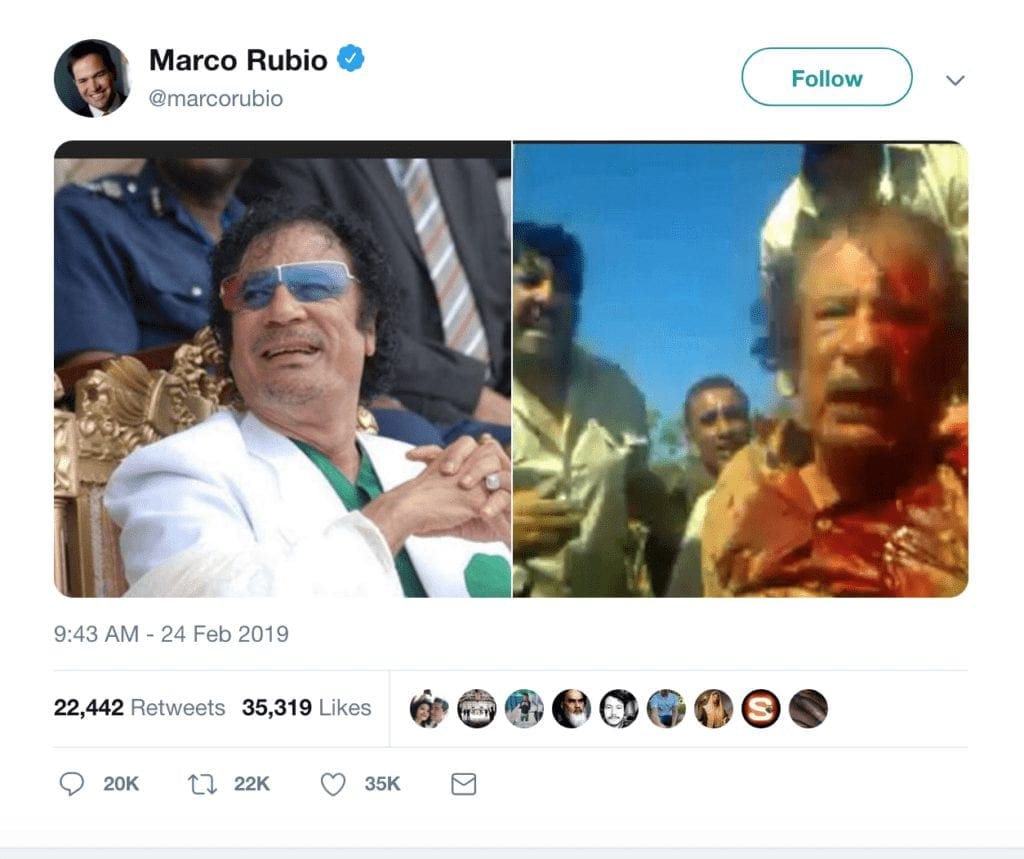On February 25, Marco Rubio posted a cryptic before and after photo of Muammar Gaddafi that caused quite a stir on social media.
Lost in this photo was the political context.
Gaddafi was historically a thorn in the side of U.S. interests since the late 1970s. When the Arab Spring transpired in 2011, Libya broke into civil war. This compelled the U.S. and its NATO coalition to take action and support anti-Gaddafi rebels to remove him from power.
Gaddafi was ultimately deposed as the NATO-backed Libyan rebels captured and killed him in broad daylight. A still image from the video of that infamous incident was the after image in Rubio’s post.

This was no casual tweet.
Given the past month of U.S. saber-rattling towards Venezuela, Rubio’s tweet was a veiled threat to Venezuelan leader Nicolás Maduro.
On January 10, 2019, the opposition-controlled National Assembly of Venezuela declared that Maduro’s 2018 reelection bid was illegitimate and named the National Assembly President Juan Guaidó as the acting president of Venezuela. On January 23, the U.S. later recognized Guaidó as the legitimate head of Venezuela.
As a result, Venezuela has descended into a presidential crisis that has garnered considerable international attention. The U.S. has led the charge against the Venezuelan government by imposing sanctions on state owned-oil company PDVSA for supposedly plundering resources and certain government officials who have obstructed the entrance of humanitarian aid into Venezuela.
Pressure on Venezuela increased when foreign policy advisor John Bolton, a seasoned interventionist, had discretely scribbled on his notepad a few lines about deploying 5,000 troops to Colombia, which the public could see during a White House briefing. Naturally, speculation about potential military intervention in Venezuela has emerged.
Although he has not openly called for military action to depose Maduro, Marco Rubio has flirted with the idea in the past and has generally agreed with Trump’s stance to have “all options” on the table when dealing with Venezuela.
Rubio’s controversial tweet came in response to a violent weekend on February 23, when pro-government militia forces clashed with the opposition, leaving four people dead. This incident was sparked by a shipment of humanitarian aid coming from Colombia, which the government and its allies tried to break up.
Whether or not Guaidó is the legitimate leader of Venezuela is neither here nor there. What is certain is that the U.S. should stay out of Venezuela altogether.
The U.S. simply cannot afford to be involved in another military excursion. There’s no telling the unintended consequences — lives lost, the number of people displaced, and fiscal damage — that such an endeavor will bring.
The U.S. has spent more than $1 trillion in Iraq and Afghanistan, respectively.
Additionally, the U.S. has sustained significant casualties, losing 2,350 troops in Afghanistan and 4,488 troops in Iraq. However, civilian collateral damage completely dwarfs U.S. military losses in these areas with conservative estimates pointing to nearly 250,000 being killed in Afghanistan and Iraq.
A similar scenario would likely play out if the U.S. were to get involved in the region. However, this is the Venezuelan people’s fight. If Americans want to get involved, they should do so in a private capacity through humanitarian aid or private security services.
But, we should not reflexively turn to military action to fix Venezuela or any nation, for that matter. With the national debt at $22 trillion, the U.S. is teetering on the edge of fiscal collapse. Another foreign adventure would put the country on the downward spiral of economic turmoil.
Venezuela is the current poster child of socialist failure. At the core of national sovereignty is the right for nations to fail. These failed models give us important information on what policies generate economic prosperity and what policies lead to economic collapse.
In the Venezuelan case, it’s clear that socialism has left it in shambles, just like it has done to countless other countries. However, that does not obligate the U.S. to intervene in Venezuela. In fact, many countries like the Baltic Tigers of Estonia, Latvia, and Lithuania were able to defeat socialism and transition to capitalism without foreign intervention.
Not all hope is lost in Venezuela.
Alternatives like secession, are viable ways to break-up the oppressive Venezuelan state and offer Venezuelans an escape option.
However, we must remember that the same government that mismanages our economy, capable of making countries like Venezuela even worse should it decide to intervene.

























